The U.S. Food and Drug Administration (FDA) has granted accelerated approval for Aduhelm (aducanumab-avwa) as the first and only drug for Alzheimer’s in almost two decades.
Biogen and Eisai announced that the FDA has granted accelerated approval of the Alzheimer’s drug to address a defining pathology of the disease by reducing amyloid-beta plaques in the brain, according to ET Health World.
The agency’s approval is based on data from clinical trials showing the effect of Aduhelm on reducing amyloid-beta plaques, which is a biomarker of the disease that is reasonably likely to predict clinical benefit, in this case, a reduction in clinical decline.
Biogen CEO Michel Vounatsos said, “This historic moment is the culmination of more than a decade of groundbreaking research in the complex field of Alzheimer’s disease. We believe this first-in-class medicine will transform the treatment of people living with Alzheimer’s disease and spark continuous innovation in the years to come.”
“We are grateful for the contributions of thousands of patients and caregivers who participated in our clinical trials, as well as for the dedication of our scientists and researchers,” he added. “Together with the healthcare community, we are ready to bring this new medicine to patients and begin to address this growing global health crisis.”
Eisai CEO Haruo Naito said, “Eisai has been working on the creation of new treatments for Alzheimer’s disease since the early 80s through our relentless pursuit to understand the root causes of this disease, and we have spent more than a quarter of a century with people living with Alzheimer’s disease to understand their needs.”
“We are very pleased to be able to open a new chapter in the history of Alzheimer’s disease treatment with the approval of Aduhelm,” he added.
“This approval has the potential to bring hope to the future of global health, society and, most importantly, the patients and their families, and represents a great step toward the advancement of holistic ecosystem solutions for this devastating disease,” Naito explained.
The drug’s safety profile is well-documented in over 3,000 patients who received at least one dose of Aduhelm.
One of the commonly reported adverse events was a radiographic detection called Amyloid Related Imaging Abnormalities (ARIA).
The common side effect in patients with ARIA was a headache. Others included confusion, dizziness, visual disturbances, and nausea. Biogen is now planning to conduct a controlled trial to verify the drug’s clinical benefits in patients with Alzheimer’s, which is a part of the accelerated approval.























